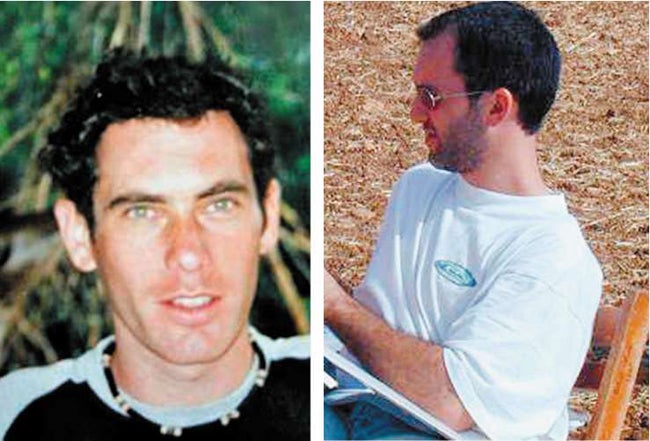Israel to swap killer for two dead soldiers

Your support helps us to tell the story
From reproductive rights to climate change to Big Tech, The Independent is on the ground when the story is developing. Whether it's investigating the financials of Elon Musk's pro-Trump PAC or producing our latest documentary, 'The A Word', which shines a light on the American women fighting for reproductive rights, we know how important it is to parse out the facts from the messaging.
At such a critical moment in US history, we need reporters on the ground. Your donation allows us to keep sending journalists to speak to both sides of the story.
The Independent is trusted by Americans across the entire political spectrum. And unlike many other quality news outlets, we choose not to lock Americans out of our reporting and analysis with paywalls. We believe quality journalism should be available to everyone, paid for by those who can afford it.
Your support makes all the difference.Israel's cabinet has decided to free a Lebanese guerrilla responsible for a notoriously brutal attack on an Israeli civilian family in return for the bodies of the two soldiers whose abduction triggered the 2006 Lebanon war.
The cabinet decision – by 22 votes to three – clears the way for a prisoner exchange with Hizbollah to be completed over the next fortnight to secure the return of the reservists Ehud Goldwasser and Eldad Regev.
The Israeli Prime Minister, Ehud Olmert, said during the five-hour cabinet meeting for the first time that the state had concluded that the two soldiers had died either during the Lebanese guerrilla group's cross-border raid in July 2006, or soon afterwards.
Under the deal, Israel will also receive the body parts of other dead soldiers, along with a report on Ron Arad, the airman declared missing after his plane crashed in Lebanon in 1986. In return it will release five Lebanese prisoners, a dozen bodies, mostly of Hizbollah militants, and an unspecified number of Palestinian prisoners.
Easily the most sensitive of the Lebanese prisoner releases is that of Samir Kuntar, who in 1979 infiltrated across the border and is serving multiple life sentences for an attack in the northern Israeli town of Nahariya in which he shot Danny Haran in front of his four-year-old daughter.
Witnesses said that Kantar – then aged 16 – then smashed the skull of Mr Haran's daughter against a rock with his rifle butt. Mr Haran's wife, Smadar, accidentally suffocated her other daughter, aged two, as she tried to prevent her screaming as they hid in their apartment during the attack. Kuntar has denied killing the four-year-old.
Yesterday's decision followed a protracted period of heart searching within the Israeli security establishment over the prisoner release, intensified by a vigorous media and lobbying campaign for the exchange by the abducted reservists' families. While the Israeli military's chief-of-staff, Lt-Gen Gabi Ashkenazy, strongly supported the exchange, the heads of the main intelligence agencies, Shin Bet and Mossad, opposed the deal. Opponents of the exchange have argued that swapping bodies for live prisoners would increase the incentive for hostage taking by militant groups while reducing that for keeping the hostages alive once in captivity.
Mr Olmert, who last week had appeared to reconsider the German-mediated exchange, did finally recommend that it went ahead – while acknowledging that the debate "is exceptionally sensitive in terms of its national and moral implications". Three cabinet members, Justice Minister Daniel Friedmann, Housing Minister Ze'ev Boim and Finance Minister Ronny Bar-On, opposed the exchange.
Most of the Israeli media was strongly in favour of the exchange going ahead with the mass-circulation daily Yedhiot Ahronot proclaiming "Bring them Home" in a front-page headline yesterday. The Maariv headline said under a picture of Mr Goldwasser's parents and Mr Regev's father: "Look into their teary eyes." But Yossi Beilin, the prominent Knesset member in the left-wing Meretz party, told Israel Radio before the cabinet meeting: "If they are dead, I certainly oppose this deal. The principle must be releasing live prisoners for live hostages, and releasing bodies in return for the fallen."
The Israeli military acknowledged last year that the two soldiers had been seriously injured in the raid after which Mr Olmert took Israel into a month-long war which cost the lives of more than 130 Israeli soldiers and civilians and more than 1,000 Lebanese casualties. Hizbollah has never produced any evidence that Mr Regev and Mr Goldwasser were still alive.
Mr Olmert told the cabinet: "We know what happened to them. As far as we know, the soldiers Regev and Goldwasser are not alive."
Mr Goldwasser's wife, Karnit, who has travelled the world to press leaders to push for her husband's release, said she was still trying to come to terms with the Prime Minister's declaration. She added: "My heart aches. It is very difficult for me. I am very tired, drained inside. All I want to do is to digest things, try to understand what happened ... to rest a bit ... to have my pain."
Mr Haran's widow, Smadar, said that she was devastated by the decision but understood it. "The despicable murderer Kantar was never my own personal prisoner, but the state's prisoner," she told a news conference. "Even if my soul should be torn, and it is torn, my heart is whole."
Join our commenting forum
Join thought-provoking conversations, follow other Independent readers and see their replies
Comments